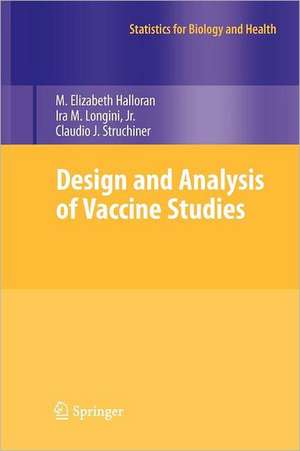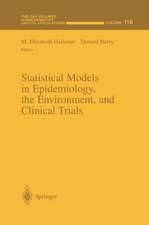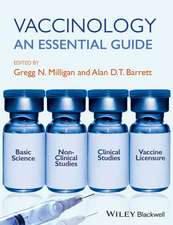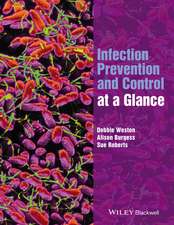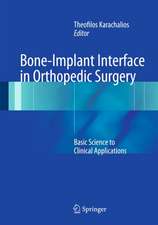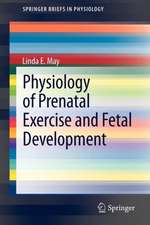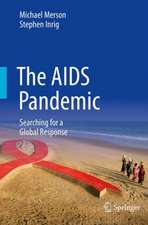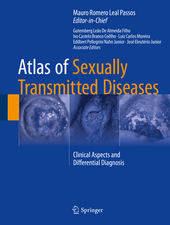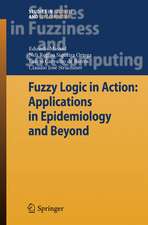Design and Analysis of Vaccine Studies: Statistics for Biology and Health
Autor M. Elizabeth Halloran, Ira M. Longini, Jr., Claudio J. Struchineren Limba Engleză Paperback – 25 feb 2012
| Toate formatele și edițiile | Preț | Express |
|---|---|---|
| Paperback (1) | 1415.75 lei 6-8 săpt. | |
| Springer – 25 feb 2012 | 1415.75 lei 6-8 săpt. | |
| Hardback (1) | 1422.87 lei 6-8 săpt. | |
| Springer – 9 noi 2009 | 1422.87 lei 6-8 săpt. |
Din seria Statistics for Biology and Health
- 20%
 Preț: 633.24 lei
Preț: 633.24 lei - 17%
 Preț: 352.01 lei
Preț: 352.01 lei - 20%
 Preț: 776.72 lei
Preț: 776.72 lei - 20%
 Preț: 1376.35 lei
Preț: 1376.35 lei - 18%
 Preț: 1394.84 lei
Preț: 1394.84 lei - 18%
 Preț: 883.59 lei
Preț: 883.59 lei - 5%
 Preț: 843.91 lei
Preț: 843.91 lei -
 Preț: 397.16 lei
Preț: 397.16 lei - 20%
 Preț: 1002.67 lei
Preț: 1002.67 lei - 18%
 Preț: 1395.32 lei
Preț: 1395.32 lei - 5%
 Preț: 1102.10 lei
Preț: 1102.10 lei - 5%
 Preț: 874.83 lei
Preț: 874.83 lei - 15%
 Preț: 657.39 lei
Preț: 657.39 lei - 18%
 Preț: 960.93 lei
Preț: 960.93 lei - 15%
 Preț: 585.90 lei
Preț: 585.90 lei - 5%
 Preț: 852.69 lei
Preț: 852.69 lei - 18%
 Preț: 903.62 lei
Preț: 903.62 lei - 5%
 Preț: 721.40 lei
Preț: 721.40 lei - 15%
 Preț: 653.46 lei
Preț: 653.46 lei - 18%
 Preț: 2114.90 lei
Preț: 2114.90 lei - 18%
 Preț: 1108.99 lei
Preț: 1108.99 lei - 5%
 Preț: 821.39 lei
Preț: 821.39 lei - 5%
 Preț: 849.02 lei
Preț: 849.02 lei - 15%
 Preț: 653.14 lei
Preț: 653.14 lei - 18%
 Preț: 958.56 lei
Preț: 958.56 lei - 5%
 Preț: 722.69 lei
Preț: 722.69 lei - 18%
 Preț: 728.74 lei
Preț: 728.74 lei - 18%
 Preț: 943.22 lei
Preț: 943.22 lei - 5%
 Preț: 1092.43 lei
Preț: 1092.43 lei - 15%
 Preț: 594.21 lei
Preț: 594.21 lei - 5%
 Preț: 377.87 lei
Preț: 377.87 lei - 18%
 Preț: 1124.60 lei
Preț: 1124.60 lei - 18%
 Preț: 1220.12 lei
Preț: 1220.12 lei - 15%
 Preț: 632.98 lei
Preț: 632.98 lei - 18%
 Preț: 1394.84 lei
Preț: 1394.84 lei -
 Preț: 389.11 lei
Preț: 389.11 lei - 18%
 Preț: 959.98 lei
Preț: 959.98 lei
Preț: 1415.75 lei
Preț vechi: 1490.25 lei
-5% Nou
Puncte Express: 2124
Preț estimativ în valută:
270.91€ • 289.69$ • 225.87£
270.91€ • 289.69$ • 225.87£
Carte tipărită la comandă
Livrare economică 18 aprilie-02 mai
Preluare comenzi: 021 569.72.76
Specificații
ISBN-13: 9781461424888
ISBN-10: 1461424887
Pagini: 408
Ilustrații: XVIII, 390 p.
Dimensiuni: 155 x 235 x 21 mm
Greutate: 0.57 kg
Ediția:2010
Editura: Springer
Colecția Springer
Seria Statistics for Biology and Health
Locul publicării:New York, NY, United States
ISBN-10: 1461424887
Pagini: 408
Ilustrații: XVIII, 390 p.
Dimensiuni: 155 x 235 x 21 mm
Greutate: 0.57 kg
Ediția:2010
Editura: Springer
Colecția Springer
Seria Statistics for Biology and Health
Locul publicării:New York, NY, United States
Public țintă
ResearchCuprins
and Examples.- Overview of Vaccine Effects and Study Designs.- Immunology and Early Phase Trials.- Binomial and Stochastic Transmission Models.- and Deterministic Models.- Evaluating Protective Effects of Vaccination.- Modes of Action and Time-Varying VE.- Further Evaluation of Protective Effects.- Vaccine Effects on Post-Infection Outcomes.- Household-Based Studies.- Analysis of Households in Communities.- Analysis of Independent Households.- Assessing Indirect, Total, and Overall Effects.- Randomization and Baseline Transmission.- Surrogates of Protection.
Recenzii
From the reviews:
“…The first comprehensive book on the topic of vaccine trials, their design and analysis. Given the recent interest in developing vaccines, …the book is timely, relevant and important. The authors are in the vanguard of the statistical and epidemiology aspects of vaccine research and development, and their combined expertise covers an impressively broad range of topics. …Useful for a diverse audience: graduate students, practicing biostatisticians, and professionals in epidemiology and infectious diseases.” (Journal of Biopharmaceutical Statistics)
“In their recent book … Halloran, Longini, Struchiner present many years of research on such studies much of which they have conducted. The book is aimed at three audiences: researchers specializing in vaccines and infectious diseases, those aiming to read their studies and students in related fields … . The book includes problems at the end of each chapter along with answers … . this is a well written and informative book. I recommend it to anyone interested in learning about vaccine studies.” (Matthew C. Wiener, Technometrics, Vol. 53 (1), February, 2011)
“Researchers and postgraduate students in infectious disease epidemiology and biostatistics. … useful to every practicing biostatistician and epidemiologist in the field. … the authors have succeeded in writing an impressive overview of a complex topic. … the book belongs to the shelf of all those interested in the analysis of infectious disease data. More generally, the book serves a useful textbook of statistics applied to real-life problems in which the balance between substantive research questions and the availability of data always remains an issue.” (Kari Auranen, International Statistical Review, Vol. 78 (3), 2010)
“The book’s main audience comprises two groups: clinical/basic scientists involved in research in vaccine studies and students/researchers in statistics/epidemiology interested in statistical methodologiesfor evaluating vaccination efficacy. … reader interested in more technical details is provided with adequate references. … Every aspiring statistical researcher and epidemiologist interested in vaccine studies should have this book on his or her shelf as an essential guide and reference for learning the subject, understanding the current state of the literature … .” (Debajyoti Sinha, Journal of the American Statistical Association, June, 2011)
“Any book targeting a wide audience with technical material confronts the problem of balancing rigor with accessibility. Design and Analysis of Vaccine Studies largely succeeds at this task. A cursory reading of this book will give readers an understanding of the concepts and techniques needed to successfully analyze vaccine studies … . Halloran, Longini, and Struchiner have produced a text that can serve as a valuable resource for epidemiologists, biostatisticians, and anyone interested in the design and analysis of vaccine studies.” (Derek A. T. Cummings and Justin Lessler, American Journal of Epidemiology, Vol. 174 (7), October, 2011)
“…The first comprehensive book on the topic of vaccine trials, their design and analysis. Given the recent interest in developing vaccines, …the book is timely, relevant and important. The authors are in the vanguard of the statistical and epidemiology aspects of vaccine research and development, and their combined expertise covers an impressively broad range of topics. …Useful for a diverse audience: graduate students, practicing biostatisticians, and professionals in epidemiology and infectious diseases.” (Journal of Biopharmaceutical Statistics)
“In their recent book … Halloran, Longini, Struchiner present many years of research on such studies much of which they have conducted. The book is aimed at three audiences: researchers specializing in vaccines and infectious diseases, those aiming to read their studies and students in related fields … . The book includes problems at the end of each chapter along with answers … . this is a well written and informative book. I recommend it to anyone interested in learning about vaccine studies.” (Matthew C. Wiener, Technometrics, Vol. 53 (1), February, 2011)
“Researchers and postgraduate students in infectious disease epidemiology and biostatistics. … useful to every practicing biostatistician and epidemiologist in the field. … the authors have succeeded in writing an impressive overview of a complex topic. … the book belongs to the shelf of all those interested in the analysis of infectious disease data. More generally, the book serves a useful textbook of statistics applied to real-life problems in which the balance between substantive research questions and the availability of data always remains an issue.” (Kari Auranen, International Statistical Review, Vol. 78 (3), 2010)
“The book’s main audience comprises two groups: clinical/basic scientists involved in research in vaccine studies and students/researchers in statistics/epidemiology interested in statistical methodologiesfor evaluating vaccination efficacy. … reader interested in more technical details is provided with adequate references. … Every aspiring statistical researcher and epidemiologist interested in vaccine studies should have this book on his or her shelf as an essential guide and reference for learning the subject, understanding the current state of the literature … .” (Debajyoti Sinha, Journal of the American Statistical Association, June, 2011)
“Any book targeting a wide audience with technical material confronts the problem of balancing rigor with accessibility. Design and Analysis of Vaccine Studies largely succeeds at this task. A cursory reading of this book will give readers an understanding of the concepts and techniques needed to successfully analyze vaccine studies … . Halloran, Longini, and Struchiner have produced a text that can serve as a valuable resource for epidemiologists, biostatisticians, and anyone interested in the design and analysis of vaccine studies.” (Derek A. T. Cummings and Justin Lessler, American Journal of Epidemiology, Vol. 174 (7), October, 2011)
Textul de pe ultima copertă
Widespread immunization has many different kinds of effects in individuals and populations, including in the unvaccinated individuals. The challenge is in understanding and estimating all of these effects. This book presents a unified conceptual framework of the different effects of vaccination at the individual and at the population level. The book covers many different vaccine effects, including vaccine efficacy for susceptibility, for disease, for post-infection outcomes, and for infectiousness. The book includes methods for evaluating indirect, total and overall effects of vaccination programs in populations. Topics include household studies, evaluating correlates of immune protection, and applications of casual inference. Material on concepts of infectious disease epidemiology, transmission models, casual inference, and vaccines provides background for the reader. This is the first book to present vaccine evaluation in this comprehensive conceptual framework.
This book is intended for colleagues and students in statistics, biostatistics, epidemiology, and infectious diseases. Most essential concepts are described in simple language accessible to epidemiologists, followed by technical material accessible to statisticians.
M. Elizabeth Halloran and Ira Longini are professors of biostatistics at the University of Washington and the Fred Hutchinson Cancer Research Center in Seattle. Claudio Struchiner is professor of epidemiology and biostatistics at the Brazilian School of Public Health of the Oswaldo Cruz Foundation in Rio de Janeiro. The authors are prominent researchers in the area. Halloran and Struchiner developed the study designs for dependent happenings to delineate indirect, total, and overall effects. Halloran has made contributions at the interface of epidemiological methods, causal inference, and transmission dynamics. Longini works in the area of stochastic processes applied to epidemiological infectious disease problems, specializingin the mathematical and statistical theory of epidemics. Struchiner has contributed to understanding the role of transmission in interpreting vaccine effects.
This book is intended for colleagues and students in statistics, biostatistics, epidemiology, and infectious diseases. Most essential concepts are described in simple language accessible to epidemiologists, followed by technical material accessible to statisticians.
M. Elizabeth Halloran and Ira Longini are professors of biostatistics at the University of Washington and the Fred Hutchinson Cancer Research Center in Seattle. Claudio Struchiner is professor of epidemiology and biostatistics at the Brazilian School of Public Health of the Oswaldo Cruz Foundation in Rio de Janeiro. The authors are prominent researchers in the area. Halloran and Struchiner developed the study designs for dependent happenings to delineate indirect, total, and overall effects. Halloran has made contributions at the interface of epidemiological methods, causal inference, and transmission dynamics. Longini works in the area of stochastic processes applied to epidemiological infectious disease problems, specializingin the mathematical and statistical theory of epidemics. Struchiner has contributed to understanding the role of transmission in interpreting vaccine effects.
